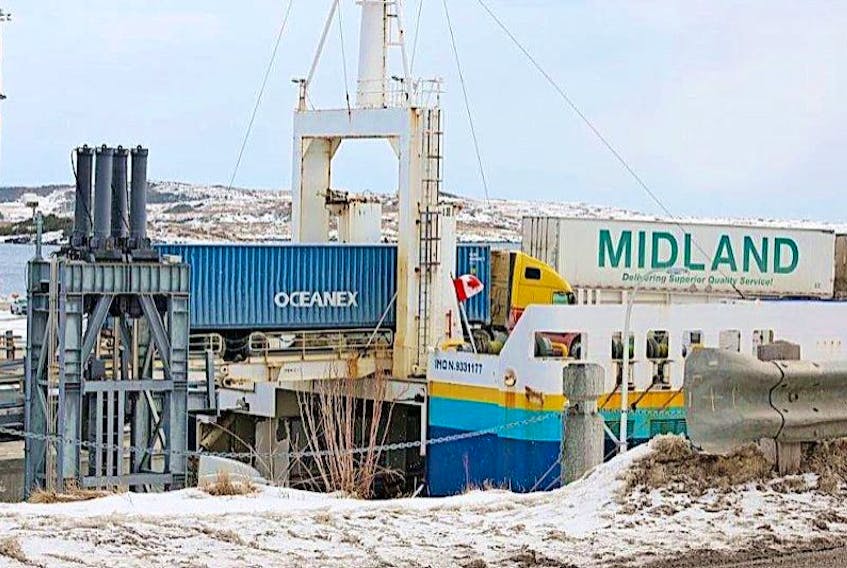
A truck hauling an Oceanex cargo container is loaded onto a Marine Atlantic ferry in Port aux Basques on March 12. Oceanex has made an application to the Federal Court of Canada for a review of Marine Atlantic’s commercial freight rates.
Oceanex Inc., a shipping company based in St. John’s, has filed an application with the Federal Court of Canada to review rates coming into effect on April 1.
In its application to the court, Oceanex is seeking a declaration that the federal minister of Transport “erred in law and exceeded his jurisdiction” when the rates were approved.
The application was filed with the federal court on Feb. 26.
But there’s concern on the southwest coast about what a decision in favour of Oceanex could mean for the region.
Port aux Basques council issued a news release recently, stating the Terms of Union that brought Newfoundland and Labrador into Confederation were not only meant to provide a ferry service to the mainland, but also to make the cost of transporting goods to Newfoundland competitive with rates on the mainland.
“We contend that without federal subsidies, freight rates will increase significantly, thus resulting in higher costs for all who live on the island and thus an unfair and unequal economic relationship with our fellow provinces,” the release stated.
The release said removal of freight subsidies could pave the way for removal of all subsidies to Marine Atlantic, which the town contends would result in increased transportation costs to and from the island.
Marine Atlantic spokesman Darrell Mercer said if the federal government were to reduce the subsidies, which accounted for 50 per cent of the company’s operating and capital costs last year, it would likely mean a rate increase across the board.
Mercer said a five-year plan that finished last year led to higher subsidies over that span, but the amount is expected to return to traditional levels.
He said Marine Atlantic received $136 million from the federal government last year.
Final numbers for the coming fiscal year have not been calculated.
As for the rates Oceanex is going to court about, Mercer said Marine Atlantic’s board of directors approves those rates. He said Marine Atlantic provides information to Transport Canada, but that department has no real decision-making authority in establishing the rates.
He said Transport Canada does determine the subsidy, which can affect Marine Atlantic’s decisions about rates.
Part of Oceanex’s application asks for the Transport minister to approve commercial freight rates sufficient to fully recover Marine Atlantic’s costs, or at least a level of subsidized rates necessary to maintain freight service between Port aux Basques and North Sydney as stated in the Terms of Union without being “injurious” to Oceanex.
Mercer said Marine Atlantic’s cost recovery is not dependent on freight rates alone.
“It’s difficult to break it down,” Mercer said. “Our subsidy comes for the entire service.”
Mercer said 70 per cent of Marine Atlantic’s traffic is commercial, most of it through Port aux Basques. The remaining 30 per cent is passenger traffic, roughly three-quarters of which occurs in the summer, Mercer said.
He said commercial traffic is heavy year-round.
“From our perspective, if you reduce the subsidy, the costs are going to at least double,” said Mercer, adding it could be even more and would not be limited to commercial traffic.
He said Marine Atlantic would have to look at its options to meet the 65 per cent cost-recovery target set by the government if it lost commercial traffic due to a rate increase.
Mercer said it’s premature to say what actions would be taken if the subsidy were reduced and the cost-recovery target remained the same, but he said there are only so many options. Along with a rate increase, it could mean service reduction to save money.
“I won’t sugar-coat it,” Mercer said. “We’re very concerned.”
The Gulf News contacted Oceanex on March 14 to request an interview with executive chairman Capt. Sid Hynes.
In an email from Oceanex spokeswoman Lori Caines, the newspaper was informed that “given the matter is before the court, Captain Hynes doesn’t have any further information to provide at this time beyond the attached information sheet.”
The information sheet stated Oceanex insists its rail and trucking competitors have an unfair advantage because of subsidized freight rates. Oceanex also stated those rates are gradually eroding its market share and negatively affecting its customers.
Hynes had spoken to other media outlets following the application being filed.
Hynes called in to VOCM’s Open Line on March 8, and spoke for nearly 10 minutes about Marine Atlantic’s subsidies.
Hynes told host Paddy Daly Oceanex has been discussing the subsidy issue with the federal government for six or seven years. He said what provoked the application for judicial review was what he described as an increase in the subsidies from 25-30 per cent to an average of 66 per cent in recent years.
“The result of that is the carriers that compete against us are essentially getting a free marine service into Newfoundland,” Hynes said. “That allows them to take business from us.”
Hynes said he didn’t think that benefit was being passed on to Newfoundlanders. He referred to the idea of national pricing — that big retailers would charge the same price for a product in St. John’s or Halifax or Toronto. Hynes said Oceanex monitors that closely and doesn’t believe it’s the case.
This isn’t the first time Hynes has voiced concerns with federal subsidies to Marine Atlantic.
In 2014, Oceanex pulled its marine freight business from the Port of Corner Brook. At the time, Hynes said the decision was made because his company could not compete with Marine Atlantic in the freight-shipping business.
“It’s hard to compete against our own tax dollars,” he said at the time. “We still have to pay the full cost of doing business. We do not share in those subsidies and we are unable to compete (in marine freight shipping).”
Hynes purchased Oceanex in 2007 for roughly $230 million and took the company private.
Prior to that, he was chairman of Marine Atlantic for four years beginning in 2000.









